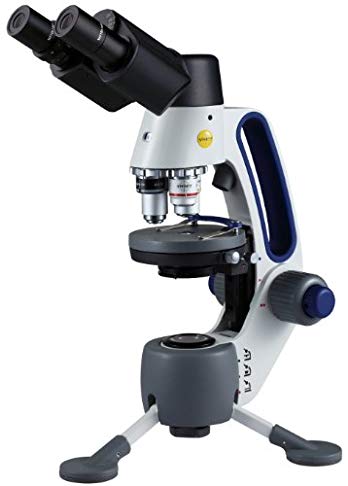The Swift Optical M3-B cordless, compound microscope has a binocular head with a 45-degree inclination and 360-degree rotation, upper (incident) and lower (transmitted) LED lighting, two 10x widefield eyepieces with interpupillary adjustment have 4x, 10x, and 40xR microscopic DIN achromatic objective lenses, a 1x macroscopic DIN achromatic objective lens, and is designed for biological use and educational applications. The 0.65 numerical aperture (N.A.) condenser, DIN achromatic 1x, 4x (0.10 N.A.), 10x (0.25 N.A.), and 40xR (0.65 N.A.) lens objectives are mounted on a four-hole ball-bearing mounted turret, and coaxial coarse and fine focus knobs provide a range of magnification and focus options. The 97 mm (4 inch) round stage has a sealed iris diaphragm, one-touch stage clips, black and white stage disks, and rack-and-pinion adjustment mechanism. The stage height can be adjusted for both microscopic and macroscopic viewing, and can hold a specimen cup for viewing liquid or larger specimens. Upper and lower LED illumination provide incidental and transmitted light, and the iris diaphragm controls the amount of light projected on or through the specimen. The adjustable tripod base is designed for use on rough or uneven surfaces, and can be removed and retracted for storage. A tripod mount allows the microscope to be mounted on a standard camera tripod for use in the field. A built-in handle promotes safe handling. The cordless, field microscope has built-in rechargeable batteries and 110/220V switchable power supply with an American-style plug. A microprocessor prevents the battery from overcharging, extending battery life. Fully charged batteries operate up to 40 hours without recharging.
Specifications
| Total optical magnification | Up to 400x |
| Eyepiece | 10x widefield, 18mm outer diameter (OD) |
| Viewing configuration | Monocular with 45 degree incline and rotating head |
| Objective lenses | 4x (0.10 N.A.), 10x (0.25 N.A.), and 40xR (0.65 N.A.) DIN achromatic microscopic, and 1x DIN achromatic macroscopic |
| Nosepiece | Four-hole on ball-bearing mounted turret |
| Focus | Coaxial coarse and fine focus |
| Illumination | LED light rated up to 50,000 hours of life |
| Condenser | 0.65 numerical aperture (N.A.) |
| Stage | 97mm/4in diameter with sealed iris diaphragm, one-touch stage clips, black and white stage disks, and specimen cup |
| Gearing | Rack and pinion |
| Power | 110V/220V switching power supply with American-style plug, with built-in rechargeable batteries with up to 500 recharges and 25,000 hours of life |
| Weight | 10.4kg/6.8lb. |
| Dimensions* | 388 x 201 x 201mm/15-1/4 x 8 x 8 inches (H x W x D) |
*H is height, the vertical distance from the lowest to highest point; W is width, the horizontal distance from left to right; D is depth, the horizontal distance from front to back.
Microscopes are instruments used to enhance the resolution of an object or image. Types include compound, stereo, or digital. Compound microscopes use a compound optical system with an objective lens and an eyepiece. Stereo microscopes show object depth in a three-dimensional image. Digital microscopes are used to display an image on a monitor, rather than looking through a lens. Microscopes can have monocular (one), binocular (two), or trinocular (three) eyepieces, with varying magnification abilities. Magnification ability refers to the size of an image. Resolution, also known as resolvant power, refers to the clarity of the image. The interaction between field of view (FOV), numerical aperture (NA), and working distance (WD) determines resolution. Microscopes can control magnification through a fixed focus, or through a range of adjustments. They can also utilize LED, fluorescent, and mirror light sources to help control viewing capabilities. Microscopes are widely used in education, lab research, biology, metallurgy, engineering, chemistry, manufacturing, and in the medical, forensic science, and veterinary industries.
Swift Optical Instruments manufactures microscopes and weather instruments. The company, founded in 1959, is headquartered in Schertz, TX.
What’s in the Box?
- Swift Optical M3-B binocular microscope
- Floating stage plate with stage clips
- Black and white stage plate
- Specimen cup with optically clear, ventilated lid
- Dust cover
- Power supply
- Instructions

